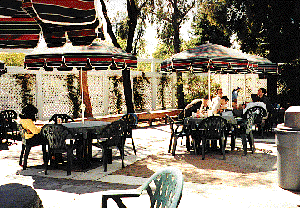GOLDSEA | ASIAMS.NET | ASIAN AMERICAN PERSONALITIES
DR DNA
PAGE 4 of 7
"Otherwise I would have to go through two more years of advanced classes before I could take the examination for college," Fong says. "At that time our family was not rich enough [for that]. At Teacher's College I actually got a stipend."
| "I realized that Ken Fong would not have the ability to imagine a technology that would have that kind of impact." |
In December of 1966, soon after Kenneth turned 20, the Fong family journeyed to San Francisco to join his father. During his first eight months in the U.S. Kenneth worked a series of odd jobs at gas stations and restaurants. By summer he was pumping gas full-time at a Mobil station in a tough black neighborhood in the Fillmore District.
"My shift was from midnight to eight," he recalls. "My boss told me if somebody put a gun there, let them have all the gas they want. Some of the guys would walk in and I would say, 'How much?' They would say, 'One.' So I give them a dollar's worth of gas. They come back and say, 'I didn't say one dollar, I said one gallon. Here's 20 cents.'"
In the fall of 1967 Fong began attending San Francisco City College. With no credit for his two years at the teacher's college and needing to improve his English, he began with general freshman courses. During his two years at City College, Fong worked a string of odd jobs at gas stations and restaurants. They were usually temporary or part-time jobs that could fit his college schedule.
In the fall of 1969 he began at San Francisco State as a junior majoring in biology and chemistry. While taking a full course load he worked a full-time job chopping vegetables and assembling food at the central kitchen of the Manning cafeteria chain. Soon after starting school he met future wife Pamela Chin at a San Francisco Presbyterian church.
"We were very religious then, less so now," Fong says.
Pamela was the first girl he ever dated seriously. Back in Hong Kong it had been taboo to do much more than take a girl to see a movie.
Despite the job and steady girlfriend, Fong managed to graduate in June of 1971 with a partial scholarship to Indiana University that paid several hundred dollars a month. By working as a teaching assistant Fong was self-supporting while working on his PhD in molecular biology.

Employees relax at the Clontech patio.
"I liked Indiana very well," he says. "A school day was always exciting. There's a lot of freedom to do the kind of things you wanted because you didn't have the [full agenda] you have later.
"Now, I want to help my managers grow, I want to see how the company should be positioned in the future to get public money. Then I have to think about a lot of political issues, my family, my kids, my wife. Back then the only thing on my mind was to finish school. It was a simple and carefree kind of day."
At Indiana he continued the relationship with Pam, which required some flying back and forth. It was understood that they were free to date others. Fong took advantage of the freedom for some "light dating". He also make a variety of new friends in the dorms where he lived.
Fong's research work was focused on isolating the genes involved in DNA repair and in the prostate metabolism. After four or five years, he came to the conclusion that he wasn't a brilliant researcher.
"I did it well, but I was not the kind of first-rate researcher I wanted to be," he says. "I found I took longer or had to make greater efforts to compete with first-rate scientists, those who are very creative in terms of coming up with innovations.
"Take the recombinant DNA technology. I realized that Ken Fong would not have the ability to imagine a technology that would have that kind of impact. I can do it but probably not as well as those I regard as first-rate scientists."
"What I'm good at is to translate it into something tangible. I'm very very good at translation. If I saw a way to isolate genes, then I [asked], 'Can I do it a little bit better or faster or a little less expensively?' That was the kind of questions I always asked." PAGE 5
Page 1 |
2 |
3 |
4 |
5 |
6 |
7 |
CONTACT US
|
ADVERTISING INFO
© 1996-2013 Asian Media Group Inc
No part of the contents of this site may be reproduced without prior written permission.
